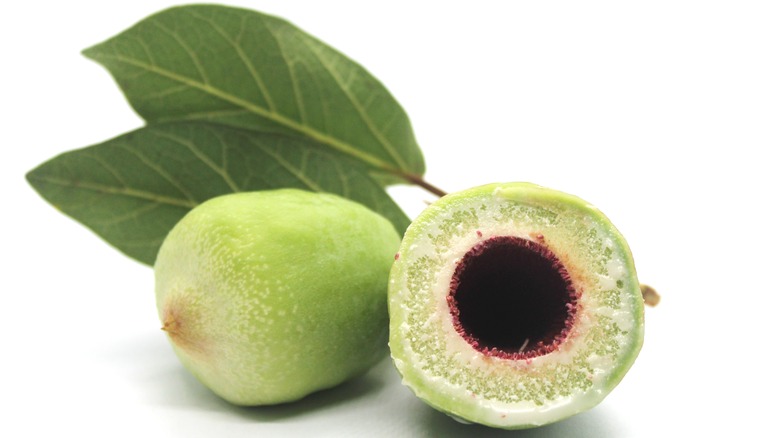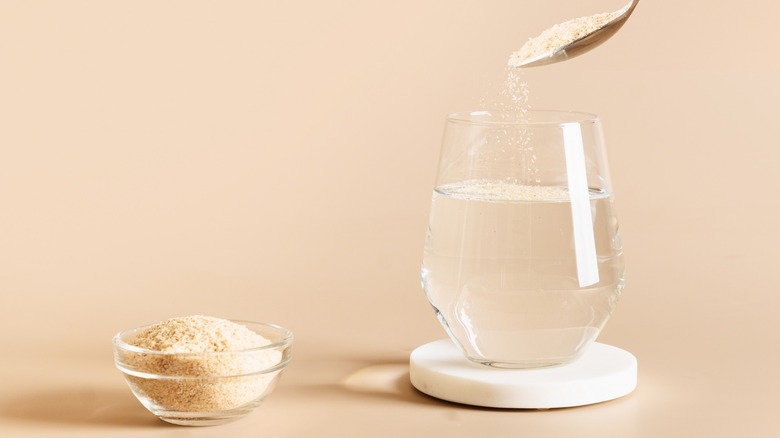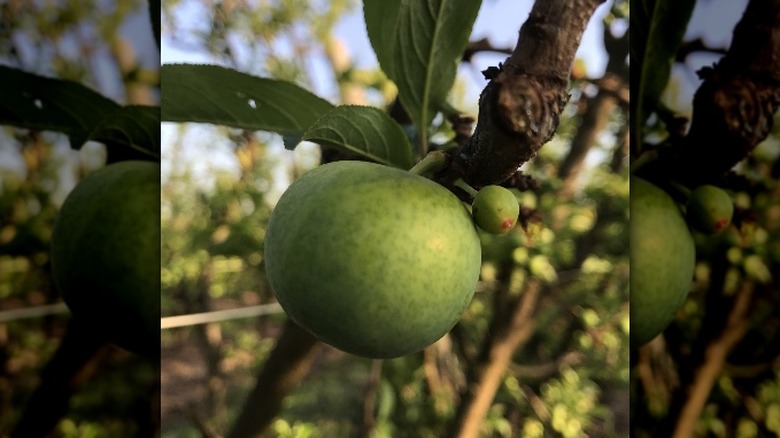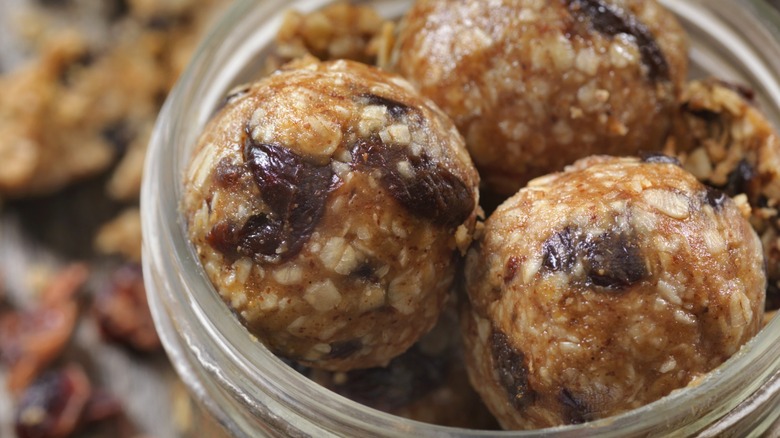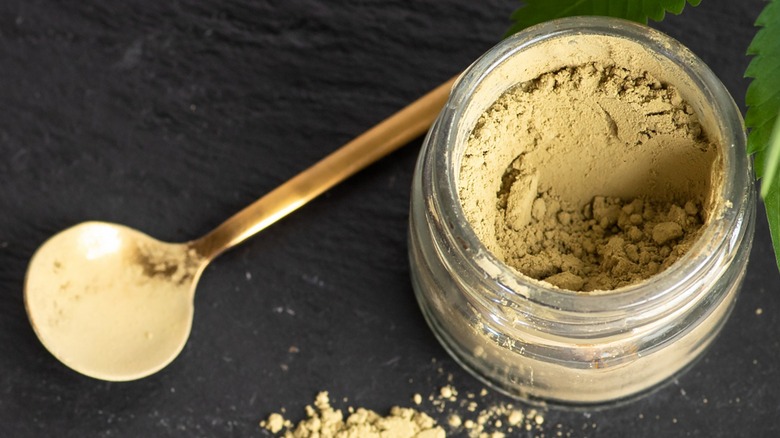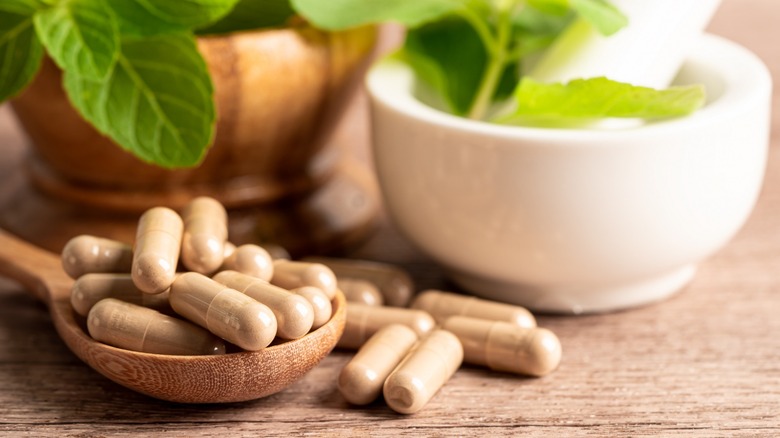What To Know About Kakadu Plums, The Fruit With The Most Vitamin C
The Kakadu plum (Terminalia ferdinandiana), also known colloquially as the billy goat plum, green plum, salty plum, murunga, gubinge, and desert lime, is native to northern and western Australia. The bright yellow-green fruits are around 1 inch long (about the size of a walnut), contain a single seed, and are round with a point at one end. Kakadu plums grow on small to medium-sized trees that can reach up to around 50 feet tall. Often eaten raw, they have been a vital bush food for the Indigenous people of northern Australia for thousands of years.
The small lime green fruit gained popularity and recognition worldwide when it was discovered to have more naturally occurring vitamin C than any other fruit (or food) in the world. It's definitely a worthy superfood that you should consider adding to your diet. Kakadu plums are packed with antioxidants, which, according to Healthline, may reduce the risk of heart disease, some cancers, and other diseases. While the plums can be cooked and made into jams, they are often eaten raw or freeze-dried to retain their nutritional content.
What are Kakadu plums?
The Kakadu plum tree is a flowering plant in the Combretaceae, or white mangrove family, which consists of tropical and subtropical trees and shrubs commonly found in mangrove habitats in Africa, Asia, the Americas, Mexico, and Australia. Kakadu plums grow naturally in the open tropical woodlands of Western Australia, the Northern Territory, and Queensland.
Numerous Kakadu plum trees can be seen along many walking paths in the wooded areas of Kakadu National Park (pictured) in the Northern Territory. Their fruits are small and pale green, are about the size of walnuts, and have fibrous, citrus-scented flesh with one large seed on the inside. When ripe, the plums are greenish-white and sometimes pink in color. The fruit appears on the trees during the tropical summer which begins in March and ends around May.
The tiny plums are an important food source, referred to as bush food, for two groups of Aboriginal people: the Bininj, who live north of Kakadu National Park, and the Mungguy who live south of the park. They also use the inner bark of the trees to treat sores and mosquito bites and create a decorative stain for tools using the tree's red sap.
Fresh Kakadu plums vs. Kakadu plum powder and supplements
Aboriginal people often eat the plums raw or fresh from the trees, but they have also been used to make jams, juices, sauces, skin care products, and medicines. Since they are grown locally and not often sold internationally in raw form, manufacturers have found ways to package them by freeze-drying the fruits and grinding them into a powder. Kakadu powder can be sprinkled on ice cream, yogurt, or salad or included in smoothies or shakes. You can even add some to a glass of water to start your day with a simple, refreshing drink packed with nutritional value.
For a quicker way to reap the benefits of this superfood, you can buy Kakadu plum capsules or dietary supplements that can be taken daily or as directed by a practitioner. Additionally, Healthline notes that the antioxidant-rich plums have been found to have several benefits for your skin by protecting against free radicals, which can cause skin damage such as dark spots, wrinkles, and sagging skin. Used in lotions, face scrubs, and serums, Kakadu plums might also work wonders for brightening your skin tone and reducing hyperpigmentation.
What do Kakadu plums taste like?
The taste of Kakadu plums differs depending on your unique tastebuds. Some people describe them as bitter and salty, while others say they are sweet but tart at the same time. They are often described as having a mix of apple and pear aromas with a citrus note and have a different flavor profile than that of more commonly encountered types of plums. Kakadu plums are generally more sour than sweet and have an astringent finish which some find similar to that of English gooseberries.
The flesh of the fruit has a fibrous texture making it well-suited for jams when cooked. Those who find the fruit too sour can add some sugar to their Kakadu plum jam to sweeten it. Kakadu plum powder also has a citrusy lemon or lime flavor, though it's more subtle than if you were eating the plum fresh or raw, making it suitable for sprinkling in a beverage or on various foods like cereal, salad, and oatmeal.
How to cook with Kakadu plums
Since Kakadu plums are not readily available in grocery stores, you'll have a hard time making your own jam or other dishes with fresh or raw plums (unless you live in the Northern Territory or Western Australia). Luckily, you can still reap the nutritional benefits of Kakadu plums by using the powdered version.
For a healthy and delicious snack, try adding Kakadu powder to an energizing no-bake protein ball recipe. No-bake energy balls typically consist of a combination of dried fruit, seeds, and peanut or almond butter, providing a perfect protein-packed snack to get you through the day. Adding Kakadu plum powder boosts the nutritional value even more and adds a bit of tanginess that pairs well with ingredients like ginger, dried pineapple, or dried cranberries. You can also add ingredients like maple syrup, chocolate chips, or honey to balance the tartness of the powder with a sweeter flavor.
Kakadu plum powder can also be added to baked goods and desserts like brownies, lemon bars, cookies, puddings, and cakes. Depending on how tangy you want your snack or dessert to taste, 1 or 2 tablespoons of powder added to the batter should do the trick.
Where to buy Kakadu plums
Fresh Kakadu plums are nearly impossible to find outside of Australia partly due to the remote location of the trees, transportation issues, and rapid deterioration of the fresh-picked fruits in the tropical climate. Commercial production of the fruit is still in its infancy and plums are currently supplied primarily from wild harvesting — which requires a government permit — as well as a few small local orchards. One of the main challenges in production lies with supporting commercial opportunities while maintaining Indigenous ownership and profit-making from the plums.
You can, however, buy Kakadu plum powder online and boost your immune system while supporting businesses owned by Indigenous people. For example, the Australian health and wellness company Roogenic sells 100% wild-harvested Kakadu plum powder with no additives or preservatives. The Australian business's powder is made from Kakadu plums harvested by the Nyul Nyul community in the Dampier region of northern Western Australia, the Marrithiel Group, and the Northern Territory's Dak-Djerait community.
Nutritional information about Kakadu plums
The Kakadu plum has gained superfood status due to its exceptionally high quantity of vitamin C and other antioxidants. Containing the highest recorded amount of vitamin C of any plant in the world, this small but powerful fruit has over 100 times the vitamin C of oranges and five times more antioxidant power than blueberries. It's a fantastic way to instantly add more vitamin C to your diet.
The plums also contain vitamin E, folate, zinc, magnesium, calcium, and lutein (which Healthline notes contributes to eye health). According to the Mayo Clinic, antioxidants, like vitamin C, are believed to play an important role in preventing damage from free radicals, which are unstable atoms that damage cells and accumulate as a result of exposure to ozone, air pollutants, cigarette smoke, and chemicals.
If you are lucky enough to get your hands on this elusive fruit, keep in mind that the nutritional quality is lowered when it's cooked. This is because vitamin C is a water-soluble vitamin and has been found to degrade when exposed to high heat. Kakadu plum powder is typically made of raw Kakadu plums that have been freeze-dried and crushed, thus retaining the fruits' full nutritional value.
